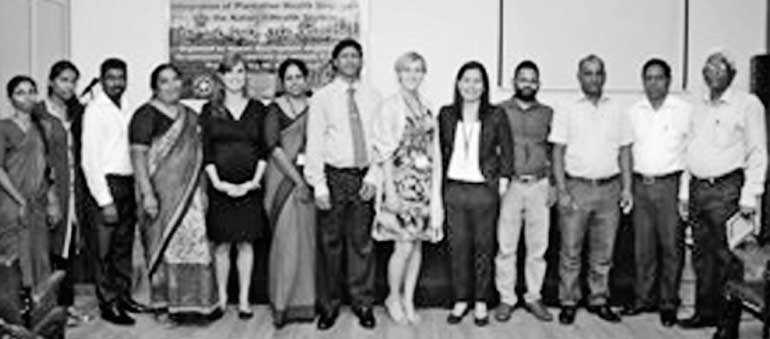Monday Feb 23, 2026
Monday Feb 23, 2026
Saturday, 18 August 2018 00:10 - - {{hitsCtrl.values.hits}}

Civil society, parliamentarians, government authorities, academics, plantation stakeholders and community members, private sector, and community-based organisations, will gather on 26 July at SLFI in Colombo to participate in a multi-sectoral discussion to speed up the integration of the plantation health structure in the national health system. The forum will be organised by Human Development Organization (HDO) and Médecins du Monde-France (MdM-F) with the support of the Agence Française de Développement.
This is the second in a series of national stakeholder discussions. The desk review ‘Policy Review on the Status of Health in the Plantation Sector: A study on Health in Sri Lanka with special focus on the Plantation Sector (specifically Sexual and Reproductive Health-related Polices and Legal Documents’ launched in May 2018 revealed several problematic areas in the healthcare delivery system in the plantation sector. The report presented full integration of the plantation health sector into the national health system as a main solution that ensures the health and reproductive health of women and children in the plantations.
Currently, 25% of the population in the plantation live without any sanitary facilities (HHI and ES 2012/2013), 35.9% of children under-five (U5) are underweight and the poverty headcount ratio in the estate sector is 10.9% vs 2.1% from urban and 7.6% from rural areas. There is also a higher incidence of home deliveries (2.2%) in the plantation sector compared to 0% in urban and 0.5% in rural areas (DHS 2006). This has led to several socio-economic problems in the plantation sector affecting the health of the children, adolescents and women in particular.
While preventive health services of the estate sector are under the provincial health authority, the curative sector is still not completely under the national health system. Although the process of nationalising estate hospitals was initiated in 1996, there are many factors delaying the process of complete integration.
The aims of this conference weighed on strengthening the dialogue and connect stakeholders to each other, following up on what each stakeholder does to push this agenda forward in their respective organisations after the round table discussion and develop a roadmap along with defined roles and responsibilities of main stakeholders for future advocacy efforts.
Discussions were elevated concerning the integration of the plantation health structure in the national forum and gather support of national actors whilst also enabling the integration of the plantation health structure into the national health system.
Médecins du Monde (MDM), or Doctors of the World in English, is a French medical organisation working since 1980 to improve access to universal health care. MDM works in 44 countries across the globe and has been working in Sri Lanka since 2005. In 2015, MDM started an overall 1 M€ project in
6 districts of Northern and Central provinces of Sri Lanka, co-funded by the Agence Française de Développement (French Development Agency, AFD). The AFD/MDM co-sponsored intervention is implemented by few local Partners in Sri Lanka.

Human Development Organization (HDO) is a non-governmental, non-profit making and non-racial national human rights organisation that works with underprivileged and marginalised communities in the plantation and rural areas of Sri Lanka. HDO is legally registered under the ‘Social Service Act’, Sri Lanka and was accredited by the ‘UN WCAR & SDGs’. The mission of HDO consists in ‘Establishment a socially just, equitable and peaceful civil society through poverty eradication and sustainable development’.
For the past 25 years, the organisation has developed appropriate strategies, methodologies and approaches to challenge the human rights and development issues among the target groups, and in the region and the country. HDO is one of the partners of MDM since 2015. The AFD/MDM co-sponsored intervention is implemented by the HDO in the plantation areas.
AFD is France’s inclusive public development bank. It commits financing and technical assistance to projects that genuinely improve everyday life, both in developing and emerging countries and in the French overseas provinces. In keeping with the United Nations Sustainable Development Goals, AFD works in many sectors – energy, healthcare, biodiversity, water, digital technology, professional training, among others – to assist with transitions towards a safer, more equitable, and more sustainable world: A world in common. Through its network of 85 field offices, AFD currently finances, monitors, and assists more than 2,500 development projects in 108 countries.
(www.afd.fr)